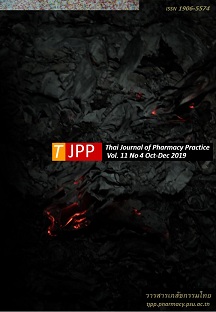ปัจจัยที่สัมพันธ์กับการบริโภคผลิตภัณฑ์อาหารอ้างสรรพคุณลดน้ำหนักของนักเรียนหญิง ระดับประกาศนียบัตรวิชาชีพ: กรณีศึกษาวิทยาลัยเทคนิคราชบุรี
Main Article Content
บทคัดย่อ
วัตถุประสงค์: เพื่อศึกษาปัจจัยที่มีความสัมพันธ์กับการบริโภคผลิตภัณฑ์อาหารที่อ้างสรรพคุณลดน้ำหนัก (food products with the claim of weight control: FPCWC) ของนักเรียนหญิงระดับประกาศนียบัตรวิชาชีพ วิธีการ: การศึกษานี้เป็นการวิจัยเชิงสำรวจแบบภาคตัดขวางในนักเรียนหญิงระดับประกาศนียบัตรวิชาชีพ 277 คนของวิทยาลัยเทคนิคราชบุรี การเก็บข้อมูลใช้แบบสอบถามเพื่อเก็บข้อมูลความรู้และทัศนคติเกี่ยวกับ FPCWC ปัจจัยด้านเพื่อน และปัจจัยทางการตลาด ผู้วิจัยยังได้สัมภาษณ์ตัวอย่าง 4 คนที่บริโภค FPCWC ที่มีรายงานการปนเปื้อนยาแผนปัจจุบันเพื่อศึกษาเพิ่มเติมถึงการตระหนักในอันตรายจากการบริโภคผลิตภัณฑ์ดังกล่าว ผลการวิจัย: ตัวอย่างมีอายุเฉลี่ย 17.3 ปี ร้อยละ 15.2 มีภาวะอ้วน แต่ร้อยละ 25.3 รับรู้ว่าตนเองอ้วน ตัวอย่างร้อยละ 57.8 เคยลดน้ำหนักด้วยการควบคุมอาหารและออกกำลังกาย ตัวอย่างร้อยละ 19.1 เคยซื้อ FPCWC ลักษณะผลิตภัณฑ์ที่มีผลต่อการตัดสินใจซื้อมากที่สุด คือ การรับรองมาตรฐาน (มีเครื่องหมาย อย.) ช่องทางการจำหน่ายและแหล่งข่าวสารหรือโฆษณาที่ได้รับเป็นหลักคืออินเทอร์เน็ต ข้อความโฆษณาที่ทำให้ตัดสินใจซื้อส่วนใหญ่ คือ การกล่าวอ้างสรรพคุณเกินจริง ตัวอย่างร้อยละ 21.7 เคยบริโภค FPCWC โดยเป็นผลิตภัณฑ์ที่มีรายงานการปนเปื้อนยาแผนปัจจุบันร้อยละ 9.0 ตัวอย่างร้อยละ 46.8 ที่เคยใช้ FPCWC เกิดอาการไม่พึงประสงค์จากการใช้ อาการที่พบมากที่สุด คือ อาการปากแห้ง รายได้ของตนเองต่อเดือน การรับรู้ภาวะน้ำหนักตัว ความพึงพอใจในภาวะน้ำหนักตัวของตนเอง ทัศนคติ และการใช้ FPCWC ของเพื่อน มีความสัมพันธ์กับการบริโภค FPCWC อย่างมีนัยสำคัญทางสถิติ สรุป: ตัวอย่างบางส่วนมีการรับรู้ภาวะน้ำหนักตัวที่ไม่ถูกต้อง คือ คิดว่าตนเองอ้วนทั้งที่ไม่ได้อ้วน ทำให้มีการบริโภค FPCWC การศึกษานี้พบการบริโภค FPCWC ที่มีรายงานการปนเปื้อนยาแผนปัจจุบันในนักเรียนหญิงระดับประกาศนียบัตรวิชาชีพ
Article Details
ผลการวิจัยและความคิดเห็นที่ปรากฏในบทความถือเป็นความคิดเห็นและอยู่ในความรับผิดชอบของผู้นิพนธ์ มิใช่ความเห็นหรือความรับผิดชอบของกองบรรณาธิการ หรือคณะเภสัชศาสตร์ มหาวิทยาลัยสงขลานครินทร์ ทั้งนี้ไม่รวมความผิดพลาดอันเกิดจากการพิมพ์ บทความที่ได้รับการเผยแพร่โดยวารสารเภสัชกรรมไทยถือเป็นสิทธิ์ของวารสารฯ
เอกสารอ้างอิง
2. Petroczi A, Taylor G, Naughton DP. Mission impossi ble? Regulatory and enforcement issues to ensure safety of dietary supplements. Food Chem Toxicol. 2011; 49:393-402.
3. Abe AM, Hein DJ, Gregory PJ. Regulatory alerts for dietary supplements in Canada and the United States, 2005-13. Am J Health Syst Pharm. 2015;72:966-71.
4. Cohen PA, Maller G, DeSouza R, Neal-Kababick J. Presence of banned drugs in dietary supplements following FDA recalls. JAMA. 2014; 312: 1691-3.
5. De Carvalho LM, Cohen PA, Silva CV, Moreira AP, Falcão TM, Dal Molin TR, et al. A new approach to determining pharmacologic adulteration of herbal weight loss products. Food Addit Contam Part A Chem Anal Control Expo Risk Assess 2012; 29: 1661 -7.
6. Ancuceanu R, Dinu M, Arama C. Weight loss food supplements: adulteration and multiple quality issues in two products of Chinese origin. Farmacia. 2013; 61: 28-44.
7. Reeuwijk NM, Venhuis BJ, de Kaste D, Hoogenboom RL, Rietjens IM, Martena MJ. Active pharmaceutical ingredients detected in herbal food supplements for weight loss sampled on the Dutch market. Food Addit Contam Part A Chem Anal Control Expo Risk Assess. 2014; 31: 1783-93.
8. Müller D, Weinmann W, Hermanns-Clausen M. Chinese slimming capsules containing sibutramine sold over the Internet: a case series. Dtsch Arztebl Int. 2009;106:218-22.
9. Kim HJ, Lee JH, Park HJ, Cho SH, Cho S, Kim WS. Monitoring of 29 weight loss compounds in foods and dietary supplements by LC-MS/MS. Food Addit Contam Part A Chem Anal Control Expo Risk Assess. 2014; 31: 777-83.
10. Yuen YP, Lai CK, Poon WT, Ng SW, Chan AY, Mak TW. Adulteration of over-the-counter slimming pro ducts with pharmaceutical analogue--an emerging threat. Hong Kong Med J. 2007;13:216-20.
11. Jamekornkul C. ASEAN post-marketing alert system. Medicine and Health Product Bulletin. 2010;13: 92-6.
12. Ozdemir B, Sahin I, Kapucu H, Celbis O, Karakoc Y, Erdogan S, et al. How safe is the use of herbal weight-loss products sold over the internet? Hum Exp Toxicol. 2013;32:101-6.
13. Food and Drug Administration. Report on laboratory analysis of health product: Annual report on 2010. Nonthaburi: Ministry of Public Health; 2010.
14. Food and Drug Administration. Report on laboratory analysis of health product: Annual report on 2011. 2011. Nonthaburi: Ministry of Public Health; 2012.
15. Food and Drug Administration. Report on laboratory analysis of health product: Annual report on 2012. 2012. Nonthaburi: Ministry of Public Health; 2013.
16. Udomlarp P. Konjac capsules for weight loss [online]. 2014 [cited Feb 10, 2018]. Available from: www.tum dee.org/alert/doc_km/Konyakky.pdf.
17. Vasanavathana S. Warning! Liver toxicity following consumption health product: case study Gacinia cambogia. Medicinal and Health Product Bulletin 2009; 12: 69-72.
18. Public and Consumer Affairs Division, Food and Drug Administration. FDA revealed over-claim of dietary supplement was number 1 of complaint. FDA News on Sep 27, 2012.
19. Lieberman HR, Marriott BP, Williams C, Judelson DA, Glickman EL, Geiselman PJ, et al. Patterns of dietary supplement use among college students. Clin Nutr. 2015; 34: 976-85.
20. Choteamnuay P, Sangprasert A, Klayjun P. Body image satisfaction and use of food products and drugs for weight control. [independent study]. Nakhon Sawan: Boromarajonani College of Nursing Sawan pracharak; 2009.
21. Bureau of Epidemiology. Obesity situation in Thai student, 2005-2009. Annual Epidemiological Surveillance Report. 2009; 52:182-4.
22. Public and Consumer Affairs Division, Food and Drug Administration. FDA and CPPA investigate the drugstore in Ratchaburi Pornpen Phamacy with many illicitl drugs. FDA News on Feb 28, 2012.
23. Ratchaburi Provincial Public Health Office. Health consumer protection and pharmacy department. annual report 2017. Ratchaburi: Ratchaburi Provincial Public Health Office; 2017
24. Serirat S. Marketing management in modern age. 2nd edition. Bangkok: Tumasan Publishing; 2003.
25. Cochran W G. Sampling techniques. 3rd ed. New York: John Wiley & Sons; 1977
26. Srihamart C.Use of food products for decreasing weight by high school female students in Khonkaen wittayayon School of Khon Kaen Province [master thesis]. Khon Kaen: Khon Kaen University; 2005.
27. Kitchanapaiboon S. Improper weight loss behavior among Thai adolescents and young adults. Nursing Journal. 2012; 39: 179-90.
28. Institute for Population and Social Research, Mahidol University. Factors affecting consumption behaviors of health products. Nonthaburi: Ministry of Public Health; 2014.
29. Jaiboonlue S. The consumption behavior of weight loss food products among students in University of phayao [independent study]. Phayao: University of Phayao; 2016.
30. Electronic Transactions Development Agency (Public Organization). Thailand internet user profile 2017. Bangkok: Ministry of Digital Economy and Society; 2017.
31. Gunta A. Body image satisfaction and use of food product and drugs for weight control among adoles- cent women [master thesis]. Chiang Mai: Chiang Mai University; 2002.
32. Tubton P. Factors affecting decision making towards the use of dietary supplements in weight loss of female vocational students in Sukhothai province [master thesis]. Phitsanulok: Naresuan University; 2015.


